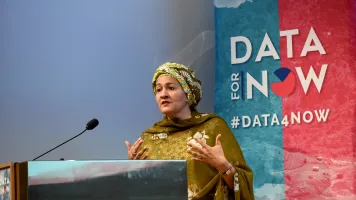AI can play a significant role in achieving the Sustainable Development Goals (SDGs). In improving outcomes across the healthcare, financial, industry, energy, and agriculture sectors, it would have a positive impact on key global issues, such as climate change and the fallout of the COVID-19 pandemic.
As part of Deutsche Gesellschaft für Internationale Zusammenarbeit's (GIZ) flagship project, Fair-Forward: Artificial Intelligence for All, the Global Partnership for Sustainable Development Data (Global Partnership) supported the development of an AI Practitioners' Guide to ensure that actionable guidance on adhering to data protection regulation and standards related to the ethical use of AI reflect the interest and needs of the Kenyan AI community. The guide, launched on April 20th in Nairobi, emerged from a multi-stakeholder consultation process over the last six months.
AI policy in Kenya faces multifaceted challenges
In November 2019, Kenya's new data protection act came into effect, establishing new standards for digital technologies such as AI. Most practitioners, including Joyce Kihara, Legal Officer at the Commission on Administrative Justice (Office of the Ombudsman) Kenya, agree that AI makes life easier. “The Access to Information Act requires government entities to publish and publicize information,” she explained. “We look at AI as a way to enable us, as an oversight institution, to be more efficient - for example, to understand what sorts of information people need and coming up with algorithms to ensure that there's easy access to information for the public through different platforms.”
And yet, as Kenya’s new data protection regime is coming into force, AI practitioners lack an actionable framework to develop and deploy AI technology in alignment with data privacy and ethical safeguards. For Eric Wamugu, a software engineer and human-centered product manager, “This means ensuring that AI applications are transparent, protect the rights of users, and are accessible. They must also be inclusive, not inadvertently perpetuating existing inequalities and discriminating against certain groups as a result of technological bias.”
Another major challenge is limited awareness and understanding of AI. According to Stacy Njimu, Industry Relations Manager at iLabAfrica, “there is a high demand among non-technical innovators who want to collaborate with experts in AI and data science as they appreciate the role of data in ensuring their businesses are running at optimum. These innovators know they need to create some sort of AI tools but are not aware of the guidelines they need to follow, the sequence and principles that need to be followed and the legal frameworks surrounding the development of that tool.” While AI is a global technology, policymakers must navigate the complex landscape of international cooperation and competition and localize it for the benefits of their citizens at national level.
Developing the AI Practitioners’ Guide
The Fair-Forward project identifies three steps to maximize the opportunities that AI presents in Kenya:
- Removal of barriers to AI adoption;
- Strengthening of local technical know-how on AI, and
- Development of policy frameworks ready for AI that ensure emerging technologies benefit humanity as a whole.
The Global Partnership collaborated with the GIZ, under the umbrella of the Digital Transformation Centre Kenya, to support the implementation of Fair-Forward's third objective above, by developing an AI Practitioners’ Guide. This is an actionable guidance framework to give concrete practical guidance for those involved in AI-based development and use and also help in shaping upcoming regulatory efforts undertaken by Kenyan regulators.
This involved the assembling and launching of a multi-stakeholder AI practitioners’ group, or Community of Practice (CoP), who were willing to volunteer their time and resources towards exchanging or sharing learnings, tools, and references on best practices on AI for public good. They would then proceed to co-authoring sections of the Guide and support dissemination of the Guide and advocacy for the opportunities it presents in achieving development outcomes and solving common challenges. The CoP was composed of relevant stakeholders representing a diverse range of sectors (government, civil society, academia, and the private sector) and a broad spectrum of technical expertise and specialties.
The CoP worked together over a series of workshops, peer-to-peer capacity building sessions, and training to first identify and address barriers to AI adoption. The group went on to develop the necessary shared knowledge and subsequently co-create a guiding document covering topics ranging from the building blocks and applications of AI; best practices in ethical deployment of AI innovations across major industries; and key legislative, legal, and regulatory considerations. The diversity of members in the CoP ensured that various challenges, perspectives, and experiences when it comes to AI use for good were represented. The Guide presents a valuable tool in guiding the development and deployment of AI in Kenya across six key factors, as summarized below.
Capacity development and innovation
The Guide begins by defining the building blocks of AI in Kenya. It identifies the foundational requirements and considerations of an enabling environment for a fair and ethical AI ecosystem, including the role of investors, local players, and government.
The concept of data dividends, in which data subjects receive a share of the revenue made from the commercialization of their data, as well as data trusts to facilitate ethical sharing of data between organizations, are introduced. There are also recommendations for various stakeholders in the tech community to address capacity gaps in AI, including peer-peer learning in both formal and informal settings, mentorship, teaching key AI concepts in schools, and covering ethical and social implications of AI in teaching activities in related fields.
I have already started using the Guide. In a meeting on harnessing digital technological solutions in business processes in Tunisia, I reminded stakeholders that AI is a component of the digital divide and Africa needs to leapfrog some developmental stages in tech, in order to successfully transition through the fourth industrial revolution. This guide provides a roadmap for acquiring and improving the necessary skills and knowledge to build and maintain AI systems.
Ethics and responsible AI
The Guide highlights principles of ethical AI, barriers and threats of AI, along with viable solutions. It underlines that the protection of human rights at both individual and collective level should be an essential prerequisite when developing AI policies. It provides guidance on best practices to develop, test, and deploy AI systems.
As we develop components such as visual AI recognition systems for collecting data, the machines we build will now be steered by certain guidelines that not only ensure we are using data responsibly, but provide a common language we can use with our clients so that they are also informed and assured about what we did and how it was done.
Standardization and collaboration
Finally, the Guide provides a deep-dive into the legal landscape for AI in Kenya at regional, continental, and international levels. While the Kenyan government has taken steps to enact regulatory frameworks that implement ethical and responsible use and application of AI across various sectors of the economy, there are hurdles in adopting AI technology at the legislative and regulatory levels.
The Guide illustrates the need for public participation, national strategies, redress for people impacted by AI, and an African Standards Strategy for the Fourth Industrial Revolution. The Strategy would provide standardization for the well-being of the African people and close the gap between the physical and digital world.
There is currently no legal framework for ethical AI practice or policy. Rather, everyone defines it according to their point of view. The principles outlined in the Guide can be called ‘soft laws’ as they illustrate key issues and factors that need to be considered from a bird’s eye view, in a way that non-technical people can understand. They also give us a policy direction by recommending practical actions, best practices and standards. This makes it easier for policymakers, for example, the cabinet secretary for Information Communication and Technology, to formulate cross-cutting laws.
Towards a fair future for AI based on human rights, democracy, and the rule of law
The Guide aims to assist policymakers, AI developers, manufacturers, established entities or startups, and users—including youth—in ensuring that AI applications are beneficial to humanity and uphold data protection rights. It acts as a way to raise awareness and educate people about AI to ensure that everyone understands its potential and its limitations. Finally, it is a key framework that can facilitate development of policies and regulations that promote transparency, accountability, and fairness in the use of AI. The AI CoP members are keen to continue disseminating and advocating for the Guide and they agree that overall, ethical AI use in Kenya will require a combination of technological, social, and legal solutions. As one of the members stated, “it is important to be cognizant of the fact that this is a living document on a very fast-changing topic, and it can only be enriched as more people are involved in reviewing and contributing to it.”
Download the guide
Find out more about Fair Forward
This project was managed by Linet Kwamboka, Senior Africa Program Manager at the Global Partnership and Annita Mwagiru, Project Management Officer at the Global Partnership.



